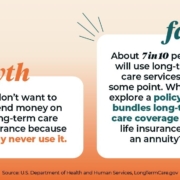How a Step-Up in Basis Can Be a Tax Dream – Part 1

Money Matters – Skloff Financial Group Question of the Month – August 1, 2024
By Aaron Skloff, AIF, CFA, MBA
Q: We read ‘How a Gift Can Be a Tax Dream or a Tax Nightmare’ Part 1 and Part 2. We also read ‘How To (Legally) Avoid Taxes When Selling Your Home’ Part 1, Part 2 and Part 3. Lastly, we read ‘How Gifting Versus Selling Your Home Can Be a Tax Dream or a Tax Nightmare’ Part 1, Part 2 and Part 3. Can you explain a step-up in basis?
The Problem – A Step-Up in Basis Can Be Confusing
From income taxes to capital gains taxes to investment surtaxes in the form of the Net Investment Income Tax (NIIT), it’s no wonder the tax code is so confusing. Understanding a step-up in basis adds one more layer of confusion.
The Solution – Understanding How a Step-Up in Basis Can Be a Tax Dream
According to the Internal Revenue Code Section 1014: “Except as otherwise provided in this section, the basis of property in the hands of a person acquiring the property from a decedent or to whom the property passed from a decedent shall, if not sold, exchanged, or otherwise disposed of before the decedent’s death by such person, be (1) the fair market value of the property at the date of the decedent’s death…”
Translation: When you die, the person inheriting your assets will have a cost basis equal to the fair market value of those assets on your date of death. In the case of an appreciated asset, the original amount you paid for the asset 1 day ago, 1 year ago, 10 years ago, 100 years ago, etc. receives a “step-up” in cost to value of the asset when you died for the person inheriting the asset. This process is called a step-up in basis. Importantly, the gain on the sale of an asset is the difference between the sales price and the cost basis. Upon a step-up in basis, the entire taxable gain is eliminated – a tax dream.
Not All Assets Receive a Step-Up in Basis. Since only certain assets receive a step-up in basis, it is important to examine the most common type of assets that receive a step-up in basis and those that do not.
Assets That Receive a Step-Up in Basis
Stocks, Bonds, Mutual Funds, ETFs
Automobiles, Personal Property
Artwork
Business Interests
Real Estate
Assets That Do Not Receive a Step-Up in Basis
401(k)s, 403(b)s, 457(b)s, Other Employer Retirement Accounts
Cash, Bank Accounts, Money Markets, Checking Accounts, CDs
IRAs
Annuities
Pensions
How a Tax Nightmare Can Become a Tax Dream. Let’s look at an example where you are going to sell stock you owned for six months. Based on good timing and good stock selection, you have a $1 million gain. Since this would be a short term capital gain, your gain would be subject to income taxes. Based on your income, your federal marginal income tax bracket is 37%, resulting in $370,000 of federal income taxes – a tax nightmare. Additionally, based on your income, your investment surtax in the form of the Net Investment Income Tax (NIIT) is 3.8%, resulting in $38,000 in taxes – a tax nightmare. If you live in a state with state income taxes or capital gains taxes, you may also be subject to state taxes – a tax nightmare.
Let’s look at an example where you are going to sell stock you owned for six months, but instead hold the stock for the rest of your life. Unfortunately, the rest of your life is only three additional months. Based on good timing and good stock selection, you have a $1.2 million gain. Since the person inheriting your stock has a new cost basis of $1.2 million, selling immediately results in no taxes – a tax dream. If the person inheriting your stock lives in a state with state income taxes or capital gains taxes, selling immediately results in no taxes – a tax dream.
Action Steps
Work closely with your Registered Investment Adviser (RIA) to reduce your taxes, and grow and preserve your wealth.
Aaron Skloff, Accredited Investment Fiduciary (AIF), Chartered Financial Analyst (CFA), Master of Business Administration (MBA) is CEO of Skloff Financial Group, a Registered Investment Advisory firm specializing in financial planning, investment management and benefits for small to middle sized companies. He can be contacted at www.skloff.com or 908-464-3060.












